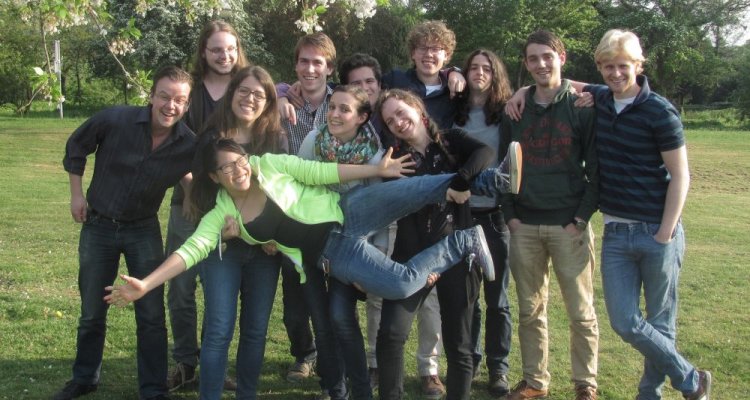
News
Students build BananaGuard for gentech competition iGEM
Wageningen students are constructing a fungus-killing soil bacteria to protect banana plants against the destructive Panama Disease. With this design the students will compete in iGEM, the International Genetically Engineered Machine competition from 30 October to 4 November in Boston, United States.
For about half a year, a team of Wageningen students has been working on the soil bacteria. The idea is to engineer bacteria that could be introduced in banana plantations where it stops fungi from reaching the roots of banana plants. The student team receives assistance from various PhD students, postdocs and staff of two Wageningen University chair groups: the Laboratory of Systems and Synthetic Biology and the Laboratory of Microbiology. Associate Professor Christian Fleck from Systems and Synthetic Biology is the overall supervisor.
Applying synthetic biology
The base material for the organism that the students are trying to build is an existing soil bacteria that is found in banana plantations. The young biotechnologists want to add as many as 13 or 14 genes to this organism. That is not easy. Altering the genome of an organism without damaging it and in such a way that it starts doing what it is supposed to do requires lots of knowledge and skills.
Make soil bacteria produce antifungal agents
Bob van Sluijs, one of the members of the Wageningen iGEM team BananaGuard, explains: "We found in literature that this bacteria can detect the Fusarium fungus. After detection it starts pumping the fusaric acid away to protect itself. We want it to also produce antifungal agents upon detection." Through this the bacteria does not only protect itself, but also the banana plants. Finding ways to fight the Panama Disease is important, because once the fungus has settled in banana plantations it is impossible to grow bananas there for years.
GMO should destruct itself after work is done
Although the student team has spent months on their design, making long days, they won't be able to present a working bacteria at the iGEM Giant Jamboree from 30 October to 4 November in Boston. "But we have developed the parts that we want to build into the bacteria and we can explain how this could be done", says Van Sluijs. The team has already succeeded in modifying the bacteria in such a way that it can produce antifungal agents after it detects the Fusarium, but they have more plans. "In society there is resistance against genetic modification. Therefore we want to add a 'kill-switch' that activates the bacteria to kill itself after it has produced antifungi. Then no GMOs will be left in the soil", Van Sluijs explains. Placing this 'kill-switch', however, requires the introduction of an additional eight genes. That is too big a task to complete in the little time that is left. But the mere fact that the team managed to produce such a kill-switch will probably give them some extra credits with the iGEM jury.
Building with biobricks and other DNA
iGEM teams are completely free to choose what organism they want to make. They all have access to the same database with standardised 'biobricks', pieces of DNA that can be added into organisms. The Wageningen team went even further. For their design the students didn't just use standardised biobricks, they also bred their own soil bacteria from which they isolated pieces of DNA that that needed for their product: BananaGuard.
245 teams to compete in iGEM
The BananaGuard team will have to compete with 244 other student teams in Boston. Teams from all over the world. The Giant Jamboree will undoubtedly be an unforgettable experience as it will be a gathering of talented, young, like-minded students with a passion for biotechnology. Taking part in iGEM requires students to invests many hours of spare time; not just in modelling and lab work, but also in finding sponsors, contacting experts (like the famous Wageningen banana researchers Gert Kema), organising events to spread the word about genetic modification and so on. All in all, iGEM is a very valuable educational experience.